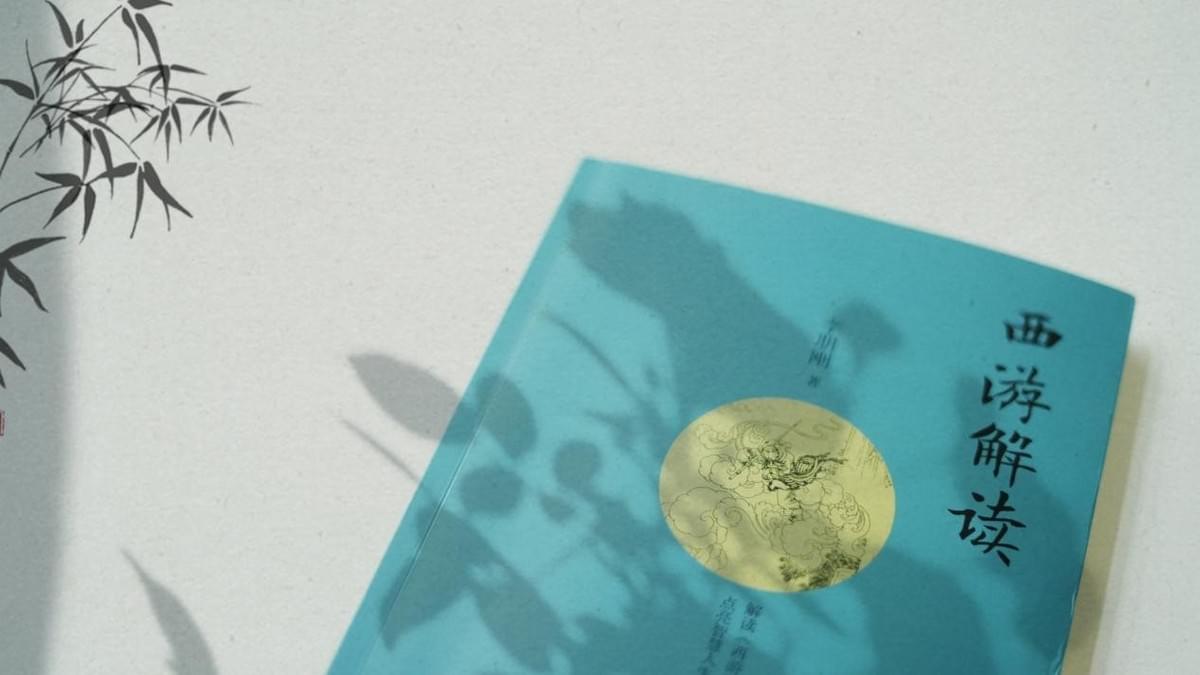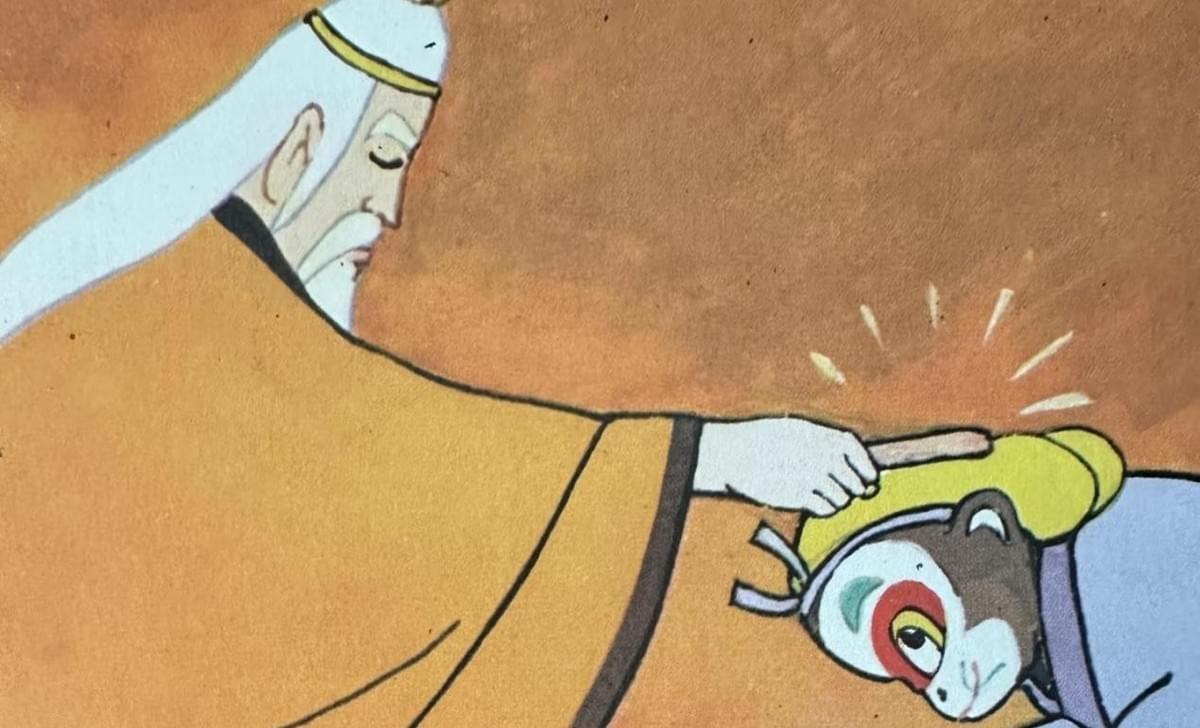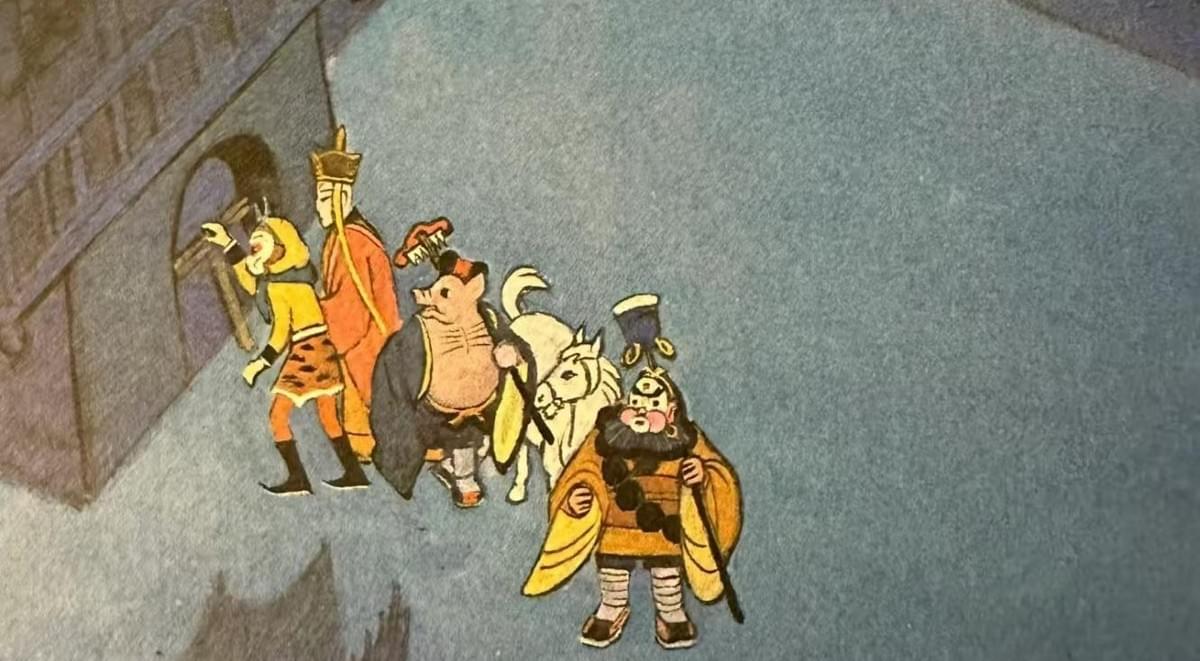西游解读前言(二)
Preface to the Interpretation of Journey to the West (Part 2)
《西游记》名字玄机:孙悟空与猪八戒暗藏修行密码
The Hidden Meaning in the Names of "Journey to the West": Sun Wukong and Zhu Bajie Conceal Cultivation Codes

千百年来,无数先贤大德殚精竭虑,致力于儒释道基本知识的普及,致力于祖国优秀传统文化的传播,《西游记》正是在这一背景下形成的。
For thousands of years, countless sages and virtuous individuals have devoted themselves to the popularization of the fundamental knowledge of Confucianism, Buddhism, and Taoism, as well as the dissemination of China's excellent traditional culture. "Journey to the West" was formed precisely under this backdrop.
接下来我们谈《西游记》,通过对《西游记》的学习,我们将看到《西游记》中所蕴含的深厚的传统文化,将体验到先贤大德们的良苦用心。
Next, we will discuss "Journey to the West." Through studying this work, we will uncover the profound traditional culture it embodies and experience the earnest intentions of the ancient sages.

一、 儒释道三教合一:《西游记》的文化根基
1. The Unity of Confucianism, Buddhism, and Taoism: The Cultural Foundation of "Journey to the West"
在中国古代漫长的历史时期,绝大多数人文化水平很低,儒释道深奥的道理,尤其是其艰涩隐晦的实证体系很难被人们认识和掌握,这是儒释道等传统文化普及工作受到很大障碍的重要因素。怎样解决这一问题呢?《西游记》用讲故事这种老百姓喜闻乐见、简单易懂的方法深入浅出地讲解儒释道基础知识,尤其是其实证体系。通过这种方式,儒释道基础知识,尤其是其实证体系不仅能够被人们轻松掌握,而且能够快速传播,迅速完成普及工作。
During the long historical period of ancient China, the majority of people had low literacy levels. The profound and abstruse principles of Confucianism, Buddhism, and Taoism, especially their esoteric systems of practice, were difficult for people to understand and master. This was a significant obstacle to the popularization of these traditional cultures. How was this problem addressed? "Journey to the West" used storytelling—a method beloved by the common people—to explain the basics of Confucianism, Buddhism, and Taoism in a simple and engaging way, particularly their systems of practice. Through this approach, the fundamental knowledge of these traditions, especially their practical systems, could be easily grasped and rapidly disseminated, achieving widespread popularity.
我们在学习《西游记》时,不仅要学习其所蕴涵的深厚的儒释道基础知识,也要学习其高效快捷、活泼可爱的传播方式,推动传统文化的普及和发展。
When studying "Journey to the West," we should not only learn the profound basics of Confucianism, Buddhism, and Taoism it contains, but also its efficient, lively, and endearing methods of dissemination, thereby promoting the popularization and development of traditional culture.

《西游记》成书时期,正是儒释道三教合一的大融合时期,因此《西游记》是以三教合一为指导思想讲解儒释道基础知识的,这一点充分体现在书中人物、故事、线索等诸多方面。这就要求我们在学习《西游记》时,要把儒释道纳入同一个体系进行学习,而不能把三者割裂开来。
The period in which "Journey to the West" was written coincided with the great integration of Confucianism, Buddhism, and Taoism. Therefore, the book was guided by the principle of unifying these three traditions to explain their basics. This is fully reflected in the characters, stories, and plotlines. Consequently, when studying "Journey to the West," we must approach Confucianism, Buddhism, and Taoism as part of a unified system rather than treating them separately.
基于此,我们在讲解《西游记》时,是和思维本体学基本知识结合起来进行讲解的,因为思维本体学是对儒释道基础知识、尤其是其实证体系的高度概括和提高,同时由于思维本体学充分吸收了心理学、量子力学等现代学科的研究成果,因此结合思维本体学基本知识讲解《西游记》,将使传统文化和现代科学知识紧密结合起来,这样不仅有于传统文化的深化、提高,也有利于通过传统文化为现代科学提供前瞻性指导意见,使现代科学能够打破学科壁垒,实现各学科之间的融合、综合。
Based on this, our interpretation of "Journey to the West" is combined with the fundamentals of "Mind Ontology." This is because Mind Ontology is a highly generalized and elevated summary of the basics of Confucianism, Buddhism, and Taoism, especially their practical systems. Moreover, as Mind Ontology fully incorporates the research findings of modern disciplines such as psychology and quantum mechanics, interpreting "Journey to the West" through its lens bridges traditional culture and modern scientific knowledge. This not only deepens and elevates traditional culture but also provides forward-looking guidance for modern science, helping it break disciplinary barriers and achieve interdisciplinary integration.
在学习《西游记》时,尤其要注意把模型化研究和详实化研究两种方法分解开,要以详实化研究为主,以模型化研究为辅,防止本末倒置。
When studying "Journey to the West," it is particularly important to distinguish between "model-based research" and "detailed research," prioritizing the latter while using the former as a supplement to avoid putting the cart before the horse.
二、 心猿·八戒:角色命名的哲学象征
2. The Mind Monkey and Bajie: Philosophical Symbolism in Character Naming
《西游记》中唐僧凡夫俗胎,代表我们凡人,代表每一位修行人。人是由身心两部分组成的,因此我们的修行需要解决身心两方面问题。《西游记》中的人物、事件等都是按照身心两方面修行需要和实证历程进行设置和展开论述的。
In "Journey to the West," the mortal Tang Monk represents ordinary people and every practitioner. Humans are composed of both body and mind, so our cultivation must address both aspects. The characters and events in "Journey to the West" are arranged and elaborated based on the needs and processes of cultivation for both body and mind.
根据“心物一体”的基本原理,身心两方面的修行并不是截然分开的,而是密切配合的,在实证中,我们既可以通过调整思维而调整物质,也可以通过调整物质而调整思维。
According to the fundamental principle of "the unity of mind and matter," cultivation of body and mind is not separate but closely coordinated. In practice, we can adjust matter by adjusting the mind, and vice versa.

有形可见的物质建立在"选择性思维"基础上,伴随着"选择性思维"的形成而同步形成。"选择性思维"是"执着心力”强化到一定程度后衍生出来的一种思维功能,由于"执着心力"波动性很大,因此"选择性思维"是一种波动很大的思维功能。从这里我们可以看出,根据"心物一体"的基本原理,从思维角度讲,一切物质都是"执着心力"的表现形式、波动形式都是不稳定的,因此从物质角度进行实证是很难操作的,并不具有很强的可操作。
Visible and tangible matter is based on "selective thinking" and forms synchronously with it. "Selective thinking" is a function derived when "attachment mental energy" intensifies to a certain degree. Because "attachment mental energy" is highly volatile, "selective thinking" is also a highly unstable mental function. From this, we can see that, according to the principle of "the unity of mind and matter," all matter is a manifestation or fluctuation of "attachment mental energy" and is inherently unstable. Therefore, practicing from the perspective of matter is difficult and lacks strong operability.
从以上论述我们可以看出,从物质角度进行实证,我们无法直达如来藏(根本状态),而且困难很多,可操作性不强。基于此,最儒释道三家不约而同地强调从思维(心)方面进行实证。我们对自己的思维是最熟悉的,因此从思维方面进行实证具有很强的可操作性,更何况根据“心物一体"的基本原理,思维是"根本状态"的一个特征,从思维方面进行实证是可以直达如来藏的。
The above discussion shows that practicing from the material perspective cannot directly lead to the Tathāgatagarbha (fundamental state) and is fraught with difficulties and poor operability. For this reason, Confucianism, Buddhism, and Taoism unanimously emphasize practice from the perspective of the mind (thinking). We are most familiar with our own thinking, so practicing from this perspective is highly operable. Moreover, according to the principle of "the unity of mind and matter," thinking is a characteristic of the "fundamental state," so practicing from the mind can directly lead to the Tathāgatagarbha.
直达如来藏(根本状态),这样我们就能从源头研究起,就能从根本上掌握"思维和物质的演变规律"。为了能够顺利地、准确无误地证人如来藏,我们必须研究我们当前的思维,只有这样才能充分利用我们当前这种思维状态进行实证。
Reaching the Tathāgatagarbha (fundamental state) allows us to study from the source and fundamentally grasp the "evolutionary laws of mind and matter." To accurately and smoothly realize the Tathāgatagarbha, we must study our current state of thinking, as this is the only way to fully utilize it for practice.
在日常生活中,我们的心就像猿猴一样,因此《西游记》就用猴子(孙悟空)形象化地代表我们的心。孙悟空的"孙"其实是猢狲的狲,但百家姓没有这个狲,因此就用"孙"表示,这样更容易为习俗所接受,更容易把孙悟空所代表的思维功能理解为人,有利于展开故事情节。
In daily life, our mind is like a monkey. Therefore, "Journey to the West" uses the image of a monkey (Sun Wukong) to symbolically represent our mind. The "Sun" in Sun Wukong actually refers to "狲" (monkey), but since this character is not among the common surnames, "孙" (Sun) is used instead. This makes it more acceptable to customs and easier to understand Sun Wukong's represented mental functions as human, facilitating the development of the story.

如果对我们日常生活中的思维进行分析,你会发现:我们平时的思维是一种在"有意识思维"主导下的思维活动,是"选择性注意"的高频活动现象。这种思维活动具有"选择"功能和"容易形成专注"两大特征,其"选择"功能是我们当前这种思维状态有的,如来藏是没有这种功能的,因此为了证入如来藏,这种选择功能我们必须在实证中予以戒除。《西游记》用猪八戒代表"选择"功能,更为准确地说是用"猪"代表选择功能,用"八戒"表示要戒除这种功能,二者合在一起就成了"猪八戒"这个名字。
If we analyze the thinking in our daily lives, we find that it is dominated by "conscious thinking," a high-frequency activity of "selective attention." This mental activity has two main features: "selection" and "ease of forming concentration." The "selection" function is unique to our current mental state and absent in the Tathāgatagarbha. Therefore, to realize the Tathāgatagarbha, this selective function must be relinquished in practice. "Journey to the West" uses Zhu Bajie to represent the "selection" function—more precisely, "pig" (Zhu) symbolizes the selective function, while "Bajie" (Eight Precepts) signifies the need to abstain from this function. Together, they form the name "Zhu Bajie."
三、 证道密码:从命名看修行的终极目标
3. The Code of Enlightenment: The Ultimate Goal of Cultivation Through Naming
把"选择"功能分配给了猪八戒,这样自然就把"容易形成专注"这个功能留给了孙悟空。要想证入如来藏就必须培养高度专注的专注力,不过需要注意的是这种专注并不是"有意识专注",并不是建立在"选择性思维"基础上的专注,而是与如来藏相应的专注,是"潜意识专注"。如来藏具有空洞洞的心境,"空"是如来藏的一大特征,与如来藏"空"这个特征相应就是"悟空"。由此可见,虽然《西游记》用猢狲(猿猴)代表我们的心,但这里的心指的却是与如来藏相应的心,是"悟空"的心,是"潜意识专注"的心,而不是攀缘的心,因此在"孙"后面必须加上"悟空"二字加以界定,这样就形成了"孙悟空"这个名字。
By assigning the "selection" function to Zhu Bajie, the function of "ease of forming concentration" naturally falls to Sun Wukong. To realize the Tathāgatagarbha, one must cultivate a highly focused concentration. However, it is important to note that this concentration is not "conscious concentration" based on "selective thinking" but corresponds to the Tathāgatagarbha—it is "subconscious concentration." The Tathāgatagarbha is characterized by an empty and vast mental state, with "emptiness" being one of its defining features. Aligning with this "emptiness" is "Wukong" (Awakening to Emptiness). Thus, although "Journey to the West" uses a monkey to represent the mind, this mind refers to one aligned with the Tathāgatagarbha—a mind that "awakens to emptiness" and achieves "subconscious concentration," not a mind that clings to external things. Therefore, the name "Sun Wukong" is formed by adding "Wukong" after "Sun."
八戒代表"选择"功能,在日常生活中,我们的心(悟空所代表的功能)总是在"选择性思维"作用下奔波于外,《西游记》里悟空的出走每每总是因为八戒的鼓噪正是这个原因,因此孙悟空又称作孙外公。只有当孙外公不再奔波于外,而相反地能够紧紧跟随唐僧,这时候才能获得成功。
Bajie represents the "selection" function. In daily life, our mind (represented by Wukong) is always driven by "selective thinking" to wander outward. This is why in "Journey to the West," Sun Wukong's departures are often instigated by Zhu Bajie's provocations. Hence, Sun Wukong is also called "Grandfather Sun." Only when Grandfather Sun stops wandering outward and instead closely follows Tang Monk can success be achieved.
以上是从思维角度认识孙外公,孙悟空的这个"外公"称号还有另一个含义,那就是"外来的主人公"。"外来的主人公"这个称号意味着:
一、我们现在的思维不是主人公;
二、主人公在外不在内,也就是不在体内。
The above explains Sun Wukong's "grandfather" title from the perspective of the mind. This title also carries another meaning: "the external protagonist." This title implies:
1. Our current thinking is not the true protagonist.
2. The protagonist is external, not internal—that is, not within the body.

这两个问题都是道家对生命科学、对自我的认识,我们应该怎样认识这两个问题呢?我们要知道这里的"外"指的是身体外的虚空。"虚空"是一种高级物质,与这种高级物质对应的是高级思维状态,高级物质和高级思维状态具有更强的自由性和自主性,我们只有证人这种状态才能获得生命的自由和自主,因此道家认为这种状态才是真正的自我,只有与这种状态相应并证人这种状态,才能解决生命问题。基于此,道家认为主人公在外不在内,我们在实证中要与外在的这个虚空相应,要安住于这种虚空状态,要一路还虚,让这个虚空做我们的主人,只有这样才能在修行中获得成功。
These two points stem from Taoist understanding of life science and the self. How should we interpret them? We must understand that "external" here refers to the void outside the body. The "void" is a higher form of matter, corresponding to a higher state of consciousness. This higher matter and mental state offer greater freedom and autonomy. Only by realizing this state can we attain true freedom and autonomy in life. Therefore, Taoism regards this state as the true self and believes that aligning with and realizing it is the key to resolving life's problems. Based on this, Taoism holds that the protagonist is external, not internal. In practice, we must align with this external void, abide in it, and "return to the void," letting it become our master. Only then can we achieve success in cultivation.
然而事实上外面的这个虚空也是一种物质,而物质都是建立在"选择性思维"基础上,波动性非常大,不稳定,难以自主,更为重要的是"虚空"也是由如来藏生成的,因此如来藏才是真正的自我。
However, in reality, this external void is also a form of matter, and all matter is based on "selective thinking," making it highly volatile, unstable, and difficult to control. More importantly, the "void" is also generated by the Tathāgatagarbha, which is the true self.
如来藏是根本状态,我们当前这种状态是由如来藏生成的,含有如来藏成分,这一点就像浪花含有海水的成分一样。浪花就是海水,我们当前这种状态就是自我。由此可见,要想认识自我,要想获得生命的自由和自主,我们只需研究当前这种状态就可以了。通过对当前这种思维状态和物质状态的研究,我们将认识更为高级的物质状态甚至如来藏,这样我们就不仅能够获得思维方面的自由和自主,同样将获得物质方面的自由和自主,最终彻底实现生命的洒脱自在。
The Tathāgatagarbha is the fundamental state. Our current state is generated by it and contains its essence, much like how waves contain the essence of the ocean. Waves are the ocean, and our current state is the self. Thus, to understand the self and attain freedom and autonomy in life, we need only study our current state. By researching our current mental and material states, we can recognize higher states of matter and even the Tathāgatagarbha. This will grant us freedom and autonomy in both mind and matter, ultimately achieving complete liberation in life.

既然孙悟空所代表的思维功能是与如来藏相应的,这样修行重任自然就落在了孙悟空肩上,因此《西游记》中离开了孙悟空就处处受磨难,无法成功,同时也只有孙悟空能够成佛,其他人是不能成佛的。注意这里的其他人并不包括唐僧,因为唐僧代表的是所有思维功能,代表的是我们凡人。正因为唐僧代表我们凡人所具有的包括孙悟空在内的一切思维功能,因此唐僧最终也成佛。
Since the mental function represented by Sun Wukong aligns with the Tathāgatagarbha, the responsibility of cultivation naturally falls on him. This is why in "Journey to the West," without Sun Wukong, the journey is fraught with hardships and cannot succeed. Moreover, only Sun Wukong can attain Buddhahood, while others cannot. Note that "others" here does not include Tang Monk, as he represents all mental functions and ordinary people. Precisely because Tang Monk represents all mental functions, including Sun Wukong, he ultimately also attains Buddhahood.

